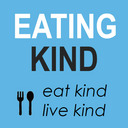by eatingkind | Feb 13, 2012 | Blog
Even as a Kindle-owner and technology-lover I still adore book stores! I love the quiet hum of conversations, the new book smell, row after row and shelf after shelf of perfect organization, and of course the books, seducing me with their clever titles and bright pictures. Add a cafe and I’m a goner…
During my last visit at Book Shop Santa Cruz, a title caught my eye as my husband and I were slowly making our way through the store: “Some We Love, Some We Hate, Some We Eat”. How perfect, I thought! In my search on kinder eating, this exact dilemma had come up very early on and I have yet to understand the hypocrisy behind those three almost arbitrary choices.
I’ll post my thoughts as I make my way through the book, which hopefully will shed some light on not only the ‘why’ of our behavior, but also how to use that knowledge to be a kinder eater.
by eatingkind | Feb 6, 2012 | Blog
It has been six months since my last posting. Even though ‘life got busy’ is a super lame excuse for having gone off the map, now that the honeymoon and buying a house are behind me, I am back with my virtual pen and paper in hand.
My returning post is somewhat related to my blogging absence, and has to do with a question of what we can do to be ‘kinder eaters’. Or any other “adjective noun” combination for that matter – faster runners, better listeners, more active blogger, etc.
While in the process of research and self-education about the commercial farming industry, I was continually reminded that animals are sentient beings, that our choices to eat some animals and not others are at best hypocritical and irrational, etc, etc. And because of those constant reminders even when given a choice of humanely-raised cow or chicken, I opted for veggie or seafood option. I wasn’t craving meat and I was eating less of it, almost without trying. I was a more ‘kinder eater’ than after the six month hiatus.
(more…)
by eatingkind | Feb 1, 2012 | Blog
Today I came across a blog post with some very insightful commentary (thanks to Pearl!) which led me to organize some of my thoughts, ideas and next steps, all of which are described on the newly added “approach” page.
“But if people don’t see the cruelty issue as enough motivation to overcome the availability / labeling / logistics / money issues, then the trick is to make it about *them*. Make it personally beneficial to them.”
What a great point! What do incredibly successful businesses and individuals have in common? They understand and live by the rule that no matter how awesome their products or ideas are and no matter how passionately they feel about them, the customer cares about one thing: “what’s in it for me“. And so they focus their marketing and selling efforts on answering exactly that question.
This insight has helped me change my approach from “help the animals” to “help yourself” which, I think, will be much more welcome and successful. Pearl also mentioned the age-old proverb “you catch more flies with honey, than vinegar”, which is the idea behind Eating Kind and a good attitude to have in all walks of life. All in all, it was a great and through-provoking read!
by eatingkind | Aug 10, 2011 | Blog
As I become more educated (or is it just aware) about the intelligence level of the animals that I eat (even the humanely raised ones) and start to see them on the same level as my dog and cats, I find myself salivating less and less often over those juicy steaks and pot roasts.
At times it is unfortunate because I really do enjoy eating meat, at times its inconvenient, especially for my husband who does all the cooking, but it’s never anything I intend to do as a statement, it just doesn’t taste as good when I’ve mentally equated my beagle with the burger I’m about to eat. I have lots more to think about and to share about this whole phenomenon, but I will save it for my “Some We Love, Some We Hate, Some We Eat” book discussion, as many of the thoughts are being driven by this latest addition to my library.
(more…)
by eatingkind | Jul 10, 2011 | Blog
On July 7th, Humane Society of the United States and the United Egg Producers have come to an unprecedented agreement, which calls for a national labeling program for all eggs sold commecially and promises to provide consumers with more information about the production practices used by egg farmers.
- Some of the requirements from the proposed legislature include:
- Elimination of barren battery cages through a phase-out period
- Allowing birds to engage in their natural behaviors, currently denied to them in cages
- Mandated labels on all egg cartons nationwide to inform consumers of the methos used to produce the eggs, such as “eggs from caged hens” or “eggs from cage-free hens”.
- Prohibiting molting through starvation
This is a great move for chicken welfare and I’m hoping we’re going to see similar developments for other farm animals.
More information available on the HSUS website.
